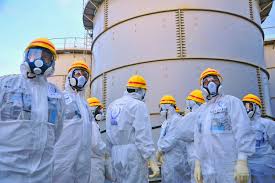Nitrate in drinking water increases the risk of colorectal cancer, according to study
07/30/2018 / By Ralph Flores

Researchers from Aarhus University in Denmark have linked increased levels of nitrate found in drinking water to the risk of developing colon and rectal cancer. The results of the study, published in the International Journal of Cancer, also revealed that the risk factors for developing the conditions occur at concentrations far below the current drinking water standard. Moreover, the study, dubbed by researchers to be the largest epidemiological study of its kind, confirms that nitrates – a common byproduct of agricultural production – is not only an environmental cause of concern but a medical one as well.
The use of nitrogen is a long-standing practice in agriculture. In the U.S., this has been widely used since the 1960s, and it has been touted as one of the factors for increased crop yield. However, this has also led to nitrate, the soluble form of nitrogen, to seep into the soil and contaminate groundwater and drinking water. In a discussion in 2016, University of Wisconsin-Madison groundwater specialist Kevin Masarik highlighted that agricultural practices had already impacted at least nine percent of groundwater wells in Wisconsin. He also highlighted the risk that nitrates pose to a person’s health, especially in pregnant women and children: “When we talk about the current nitrate standard of 10 milligrams per liter, our concerns really are infants and pregnant women because of a condition called methemoglobinemia [a condition wherein the blood cannot effectively release oxygen to body tissues, which can result to blue baby syndrome for infants].”
Aside from methemoglobinemia, studies have also shown that nitrates in groundwater can increase the risk of certain cancers. A separate study conducted by researchers from Indonesia found a significant association between nitrates in drinking water and the occurrence of colorectal cancers in the area. In another study, the same link was also discovered between waterborne ingested nitrates and colorectal cancer, as well as an increased risk of developing rectal cancer from consuming animal-derived dietary nitrate. (Related: Curcumin halts colorectal cancer, breast cancer by inducing death of cancer cells.)
In this study, researchers posited that nitrate in drinking water may develop into carcinogenic N-nitroso compounds once inside the human body. To prove this, they looked at population-based health register data and compared it with the water quality of the area. The results were measured individually to understand the link between long-term consumption of nitrates in drinking water and the risk of colorectal cancer. A total of 2.7 million adults were included in the study, and their individual exposure to nitrate was analyzed using data from water quality tests from 1978 to 2011. In total, at least 200,000 drinking water samples were tested. The main analysis included 1.7 million individuals who had the highest exposure assessment quality were included. The follow-up visit started at the age of 35.
The research team found 5,944 incidences of colorectal cancer during 23 million person-years at risk. Using the Cox proportional hazards models to evaluate the hazard ratio (HR) of nitrate exposure and its risk for colorectal cancer, they discovered that people who had the highest level of nitrates had an HR of 1.6 over those who were exposed to the lowest level. In addition, they also found that drinking water with nitrate levels above 3.87 mg/L already have an increased risk of colorectal cancer, which is below the current standard of 50 mg/L.
“The conclusion in our study is in line with the findings of several international studies, which indicates that the drinking water standard ought to be lower in order to protect against chronic health effects and not only acute effects such as Blue Baby Syndrome,” explained Professor Torben Sigsgaard, a co-author of the study. “With identical results from different studies, this points towards a need for reconsidering the drinking water standard.”
The researchers proffered the results of the study as a basis for further discussion on the chronic effects of nitrates.
Sources include:
Tagged Under: agricultural production, carcinogen, Colorectal Cancer, contaminated water, crop yield, drinking water, environment, groundwater, N-nitroso compounds, Nitrate, toxic water, water health, water quality




















